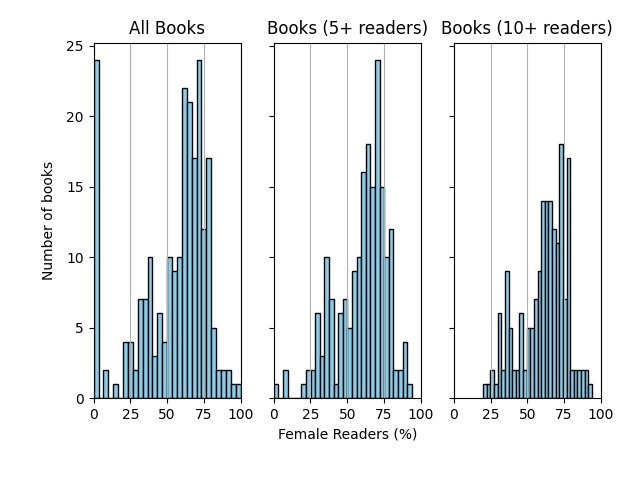The secret of the book market? Women
Click here for part two of this post
Just last week I went to the 2024 edition of FIQ1 and since my last time there was great, I was looking forward to buying appreciating a lot more content this time2. I went on the first day of the event with my wife, Letícia, and she bought a few books, making her very first visit to the event count.
One of the books she bought was a comic called Normal, by Helena Cunha, it’s a heartwarming story about coming out and trying to be a “normal” person which I read in just one sitting a few days after the festival. I usually register the books I read on Skoob and Goodreads, two communities of book lovers, and when I did it for this one on Skoob, I noticed something interesting: 94% of the readers of Normal are women3. I was shocked because despite it being a story of a young lesbian, which would tend to relate more to other women, I wouldn’t expect it to be so uneven!

Picture generated using the prompt “Several people reading books where most of them are women and just one is a man” using the Hotpot AI Art Generator (yes, I know it ignored the man 😶🌫️)
This got me curious about what the distribution looked like on other books I had read, so I opened a few random pages and saw that the readership of most books were dominated by women. I could not stop there, so I decided to do a script4 to scrape Skoob to fetch all of the information about the books I had read and try to see any correlation between the book authors or genres and their readership.
As I write this, I have registered 229 books as “read” on Skoob and this is what histograms of the number of books per percentage of female readers look like, for my reading activity:

One might have expected a normal distribution centered at 50%, meaning that the majority of books I have read would have been equally read by men and women. This is so not the case here. Here’s what we can read from them:
- Women seem to be a lot more avid readers than men, since the peaks of the histograms are centered at around 70% of female readers5.
- I’m the lone reader of roughly 10% of the books I have ever read, given the big bar on 0% when considering all books6.
- Apparently there is a case where 100% of the readers are women, even though I am one of them 🤣, hence why I decided to filter books with low readership for the other histograms on the middle and right.
This was interesting in itself, and kind of confirmed my earlier observation that women were the majority of the readership, however I still wanted to see how the male/female ratio was for the books I had read, now broken down based on the number of readers. I went through the data I had collected and started getting the book mostly read by men and women demographics at different reader counts, which is shown by the table at the end of this post. Here are a few observations:
- The books that were mostly read by men were all also written by men.
- Men could only be the majority of readers when reader count was at most 11,000.
- Since women seem to read a lot more, the books with the majority of women readers change a lot less over the samples than for the men.
- Where men were still a majority, most of the books were historical fiction and the bulk of them were related to war or conflicts (Rendezvous with Rama being the exception).
- Almost all of Conn Iggulden’s Conqueror series appear on the table, save for the book #1, so men seem to love Gengis Khan “story” more than women7.
Looking at this data was a very interesting experience, I could have done so much more if there was more time statistics: seeing the breakdown of books I have read by the author gender, comparing the readership in Brazil to the global one, if Goodreads also provided the same information, among others. I just hope some data nerd that works on one of these platforms is out there, accidentally stumbles upon my post and decides to provide more 👀. What would be something you would like to know about your reading habits? Let me know!
| Minimal #readers | Mostly read by women | Mostly read by men |
|---|---|---|
| 10 | 94%: Normal - Helena Cunha | 80%: O Buraco da Beatriz - Carlos Cardoso |
| 100 | 94%: Normal - Helena Cunha | 74%: Rendezvous with Rama (Rama #1) - Arthur C. Clarke |
| 500 | 94%: Normal - Helena Cunha | 70%: Conqueror (Conqueror #5) - Conn Iggulden |
| 980 | 94%: Normal - Helena Cunha | 69%: Empire of Silver (Conqueror #4) - Conn Iggulden |
| 1,000 | 94%: Normal - Helena Cunha | 68%: Bones of the Hills (Conqueror #3) - Conn Iggulden |
| 1,800 | 85%: The Handmaid’s Tale - Margaret Atwood | 66%: Lords of the Bow (Conqueror #2) - Conn Iggulden |
| 2,500 | 85%: The Handmaid’s Tale - Margaret Atwood | 65%: Azincourt - Bernard Cornwell |
| 10,000 | 85%: The Handmaid’s Tale - Margaret Atwood | 64%: O Espadachim de Carvão #1 - Affonso Solano |
| 11,000 | 85%: The Handmaid’s Tale - Margaret Atwood | 63%: Watchmen - Alan Moore, Dave Gibbons |
| 12,000 | 85%: The Handmaid’s Tale - Margaret Atwood | 47%: A Knight of the Seven Kingdoms - George R. R. Martin |
| 50,000 | 85%: The Handmaid’s Tale - Margaret Atwood | 43%: The Restaurant at the End of the Universe (The Hitchhiker’s Guide to the Galaxy #2) - Douglas Adams |
| 100,000 | 81%: O Mundo de Sofia - Jostein Gaarder | 40%: The Hitchhiker’s Guide to the Galaxy (The Hitchhiker’s Guide to the Galaxy #1) - Douglas Adams |
| 250,000 | 79%: Harry Potter and the Chamber of Secrets (Harry Potter #2) - J. K. Rowling | 27%: The Da Vinci Code - Dan Brown |
| 500,000 | 79%: Harry Potter and the Chamber of Secrets (Harry Potter #2) - J. K. Rowling | 21%: Harry Potter and the Prisoner of Azkaban (Harry Potter #3) - J. K. Rowling |
| 750,000 | 79%: Harry Potter and the Sorcerer’s Stone (Harry Potter #1) - J. K. Rowling | 21%: Harry Potter and the Sorcerer’s Stone (Harry Potter #1) - J. K. Rowling |
Bonus picture for those who came this far: another AI-generated image using the same prompt, but a different style ahahah

Picture generated using the prompt “Several people reading books where most of them are women and just one is a man” using the Hotpot AI Art Generator
The Belo Horizonte Festival Internacional de Quadrinhos (International Comics Festival), aka FIQ, is a fantastic event to promote local and international comic books, regardless of the author status. ↩︎
My bank account can prove that I tried very hard. ↩︎
Of over 1,000 readers, so it had some statistical significance. ↩︎
I chose not to write about the script details here since many of my readers are not programmers, but I will do a follow-up post with just the quirks of accomplishing this task. ↩︎
Or women are a lot more avid users of Skoob. ↩︎
Of course I am not the only person ever to read that book, just the first person to register as such on Skoob, which makes sense, since I have to create the book entry there sometimes. ↩︎
I mean, aren’t a lot of us his descendants, in some way? 🤡 ↩︎